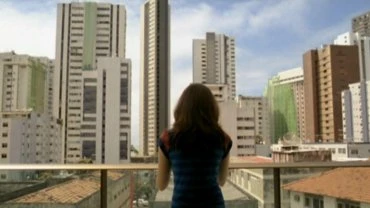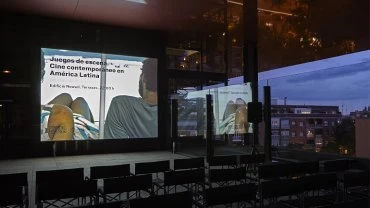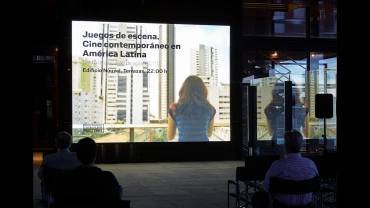-
July 16, 2015
Lucrecia Martel. La mujer rubia (The Blonde Woman)
2008. Argentina, France, Italy, Spain. Colour, sound, 87´
Screening format: hard diskThe sinister and the everyday, reality as fiction, a theatre of shadows, a stream of doubts, fears and ghosts. The third film by Argentinean film-maker Lucrecia Martel is a fitting point of departure for a series that places strategies of estrangement at its discursive centre: as explored by Martel in her first three films, it is a portrait of a social, upper and bourgeois class, tormented and fearful of an impalpable horror. Ancestral dread of something that may have occurred will occur or is occurring. “It doesn’t matter”, they say in the film. But it’s a lie, everything matters; in Martel’s films, however, events remain in the shadows, in this off-camera sound that moves away from realism to build this theatrical world.
-
July 17, 2015
Kleber Mendonça Filho. O som ao redor (Neighbouring Sounds)
2012. Brazil. Colour, sound, 131´
Screening format: hard diskThe calm that belonging to a good social class brings: upper and middle class, well-to-do. Condominiums. The reassurance of security, the illusion of a world without friction; life looking the other way. Ghosts, fear, paranoia, threats. Through the portrait of daily life in a middle-upper class neighbourhood in Recife, Kleber Mendonça Filho produces a sharp analysis of class struggles and fear as a catalyst of the growing inequality in a rapidly expanding country. I’m more interested in moods than pure facts, the director asserts. A conflict that is at once intangible and invisible and ubiquitous and inevitable forms the backbone of this film, considered one of the most accurate portrayals of the contemporary transformation in Brazil.
-
July 23, 2015
Dominga Sotomayor. Mar (Sea)
2014. Chile, Argentina. Colour, sound, 60´
Screening format: hard diskFamily and the relationships between parent and child and a couple, a constant theatrical performance, a mise en scène where we are the audience, the writers and the actors. A couple on a beach holiday stage the drama of their happy routine before the unexpected appearance of the man’s mother, who has her own ideas on this staging. In the hanging space of seafront holidays, Dominga Sotomayor sets out a semi-improvised comedy with motionless characters in flight, a straightforward puzzle where everything passes through the need to be watched.
-
July 24, 2015
Matías Piñeiro. La princesa de Francia (The Princess of France)
2014. Argentina. Colour, sound, 70´
Screening format: hard diskMatías Piñeiro spent eight years working with the same team of technicians and actors, setting up a working system that rests on the adaptation-variation binomial. Always setting out from theatre plays, Piñeiro and his team play with repetition, variation, and the tensions between staging, control and chance. These camera-led films, made as a family, are not just Shakespearean adaptations but a record of a group of friends that grew up making films, where fiction was eventually mixed into their lives, until it became cinema, and vice versa.
-
July 30, 2015
Adirley Queirós. Branco sai, preto fica (White Out, Black In)
2014. Brazil. Colour, sound, 93´
Screening format: hard diskThe Brazilian film-maker Adirley Queirós wanted to film a documentary on police brutality, with an undercurrent of racism and class, in a club in Brasilia in 1986. He contacted some of the victims, distraught and hurt by the tragedy, or mutilated or wheelchair-bound. Two of them agreed to participate in the film but under one condition: what they filmed would not be a documentary; it would be a sci-fi film. The result is a finely layered game in which the mask of genre does not conceal but reveals the tragedy.
-
July 31, 2015
Camila José Donoso and Nicolás Videla. Naomi Campbel
2013. Chile. Colour, sound, 83´
Screening format: hard diskYermén is a woman, or a man. A transsexual. A transforming body that needs masks to outwardly show who is on the inside. Like its main character, a real transsexual, the film also stands halfway between two places, alternating between a fictional mise en scène with components taken from the diaries filmed by the protagonist in VHS. The outcome of the work of these two young directors, one of the most widely travelled films in recent Chilean cinema, reveals the slurs and hypocrisies, the tensions and façades of a whole social framework: sexuality in a battlefield of new social differences, fame as a legitimising social vehicle, image as the final definition.
-
August 5, 2015
Joshua Gil. La maldad (Evilness)
2014. Mexico. Colour, sound. 75´
Screening format: hard diskAn old man lives in an isolated wooden cabin on a Mexican plain. He claims to have written a script based on his life and twelve songs for its soundtrack. This would-be film is also, or not far away from, the one staged by the director, the grandson of both the elderly protagonists that plays the leading character. Superimposing reality and representation, La maldad is not just a film about social class, but a viewfinder into life as a constant mise en scène.
-
August 6, 2015
Rubén Mendoza. Memorias del calavero (Memories of a Vagabond)
2014. Colombia. Colour, sound, 93´
Screening format: hard diskA vagabond, a man with a camera and a game of mirrors about misery and stereotypes in Latin American cinema. In the wake of Luis Ospina and Carlos Mayolo, but passed through the reflection of contemporary mirrors, humour and the most playful side of cinematography, Rubén Mendoza builds a metaphor from a swindled country, while also depicting the problems of representation in the limits and margins of cinema dominated by society’s upper classes. How, why and where is misery, impoverishment, and the other filmed?
-
August 13, 2015
Alejo Moguillansky and Fia-Stina Sandlund. El escarabajo de oro (The Gold Bug)
2014. Argentina, Denmark, Sweden. Colour, sound, 100´
Screening format: hard diskHow do we subvert the power relations of global capitalism that the world of cinema reproduces in a not-so-innocent way? One way, if not to liquidate them then at least to make them clear, is to turn them into an object of ridicule. Conceived as a project of questionable paternalism in a renowned European festival, involving the match-up of film-makers from the south with film-makers from Northern Europe, the film turns the actual film-making process into mockery, playing with the expectations that the forums from the self-righteous, well-to-do north place on film-makers from the south.

Kleber Mendonça Filho. O som ao redor (Neighbouring Sounds). Film, 2012
Held on 16, 17, 23, 24, 30, 31 Jul, 05, 06, 13 Aug 2015
This film series presents a panoramic view of recent independent film from Latin America, while also introducing a new screening area in the Museo – the transformation, for the first time, of the Nouvel Building’s outdoor terraces into a new and unprecedented open-air cinema. Scene Games is linked to the critical legacy of new film movements from the 1990s, offering an interpretation of the latest films from Latin American cinema, barely seen in Europe, where theatricality is the key element in approaching reality.
In 2007, the late Brazilian film-maker Eduardo Coutinho published a newspaper ad: he was looking for women willing to tell their life story on camera. With these anonymous women and a group of well-known actresses he made Jogo de cena (Playing). In the film they recount the same stories; a series of masks that blur personal accounts to draw a collective, sentimental and political portrait of a country undergoing significant changes. The shadow of that film looms large and unfolds this film series, a retrospective that, like the work of Eduardo Coutinho, is guided by strategies of estrangement, rewriting, farce and dramatisation as a channel of knowledge. These ideas, revolving around theatricality, are threaded together to establish an in-depth analysis of recent cinema made in Latin America, thereby setting up a link between the so-called New Argentine Cinema and what would later follow.
The films in Scene Games differ greatly from one another and hail from countries like Mexico, Brazil, Argentina, Colombia and Chile. All of them put experiments with the unreal into practice – from theatrical representation to cinematic deconstructions of narrative – and, as a whole, the series demonstrates how certain types of today’s Latin American film is presented as a white lie that, at least, aspires to reveal other bigger lies.
Programación
Gonzalo de Pedro, in collaboration with Chema González



Más actividades

Aesthetics of Peace and Desertion Tactics
8 October 2025 – 24 June 2026
The study group Aesthetics of Peace and Tactics of Desertion: Prefiguring New Pacifisms and Forms of Transitional Justice proposes a rethinking—through both a theoretical-critical and historical-artistic lens—of the intricate network of concepts and practices operating under the notion of pacifism. A term not without contestation and critical tension, pacifism gathers under its name a multiplicity of practices—from anti-militarism and anti-war movements to non-violence activism—while simultaneously opening urgent debates around violence, justice, reparation, and desertion. Here, pacifism is not conceived as a moral doctrine, but as an active form of ethical and political resistance capable of generating aesthetic languages and new positions of social imagination.
Through collective study, the group seeks to update critical debates surrounding the use of violence and non-violence, as well as to explore the conflict of their representation at the core of visual cultures. In a present marked by rearmament, war, genocide, and the collapse of the social contract, this group aims to equip itself with tools to, on one hand, map genealogies and aesthetics of peace—within and beyond the Spanish context—and, on the other, analyze strategies of pacification that have served to neutralize the critical power of peace struggles. Transitional and anti-punitive justice proposals will also be addressed, alongside their intersections with artistic, visual, and cinematic practices. This includes examining historical examples of tribunals and paralegal activisms initiated by artists, and projects where gestures, imaginaries, and vocabularies tied to justice, reparation, memory, and mourning are developed.
It is also crucial to note that the study programme is grounded in ongoing reflection around tactics and concepts drawn, among others, from contemporary and radical Black thought—such as flight, exodus, abolitionism, desertion, and refusal. In other words, strategies and ideas that articulate ways of withdrawing from the mandates of institutions or violent paradigms that must be abandoned or dismantled. From feminist, internationalist, and decolonial perspectives, these concepts have nourished cultural coalitions and positions whose recovery today is urgent in order to prefigure a new pacifism: generative, transformative, and radical.
Aesthetics of Peace and Tactics of Desertion, developed and led by the Museo Reina Sofía’s Studies Management, unfolds through biweekly sessions from October to June. These sessions alternate between theoretical discussions, screenings, work with artworks and archival materials from the Museo’s Collection, reading workshops, and public sessions. The group is structured around sustained methodologies of study, close reading, and collective discussion of thinkers such as Judith Butler, Elsa Dorlin, Juan Albarrán, Rita Segato, Sven Lütticken, Ruth Wilson Gilmore, and Franco “Bifo” Berardi; historical episodes such as the anti-nuclear and anti-arms race movement in Spain; and the work of artists and activists including Rojava Film Commune, Manuel Correa and the Oficina de Investigación Documental (Office for Documentary Investigation), and Jonas Staal, among other initial cases that will expand as the group progresses.

Institutional Decentralisation
Thursday, 21 May 2026 – 5:30pm
This series is organised by equipoMotor, a group of teenagers, young people and older people who have participated in the Museo Reina Sofía’s previous community education projects, and is structured around four themed blocks that pivot on the monstrous.
This fourth and final session centres on films that take the museum away from its axis and make it gaze from the edges. Pieces that work with that which is normally left out: peripheral territories, unpolished aesthetics, clumsy gestures full of intent. Instead of possessing an institutional lustre, here they are rough, precarious and strange in appearance, legitimate forms of making and showing culture. The idea is to think about what happens when central authority is displaced, when the ugly and the uncomfortable are not hidden, when they are recognised as part of the commons. Film that does not seek to be to one’s liking, but to open space and allow other ways of seeing and inhabiting the museum to enter stage.

Intergenerationality
Thursday, 9 April 2026 – 5:30pm
This series is organised by equipoMotor, a group of teenagers, young people and older people who have participated in the Museo Reina Sofía’s previous community education projects, and is structured around four themed blocks that pivot on the monstrous.
The third session gazes at film as a place from which to dismantle the idea of one sole history and one sole time. From a decolonial and queer perspective, it explores films which break the straight line of past-present-future, which mix memories, slow progress and leave space for rhythms which customarily make no room for official accounts. Here the images open cracks through which bodies, voices and affects appear, disrupting archive and questioning who narrates, and from where and for whom. The proposal is at once simple and ambitious: use film to imagine other modes of remembering, belonging and projecting futures we have not yet been able to live.

Remedios Zafra
Thursday March 19, 2026 - 19:00 h
The José Luis Brea Chair, dedicated to reflecting on the image and the epistemology of visuality in contemporary culture, opens its program with an inaugural lecture by essayist and thinker Remedios Zafra.
“That the contemporary antifeminist upsurge is constructed as an anti-intellectual drive is no coincidence; the two feed into one another. To advance a reactionary discourse that defends inequality, it is necessary to challenge gender studies and gender-equality policies, but also to devalue the very foundations of knowledge in which these have been most intensely developed over recent decades—while also undermining their institutional support: universities, art and research centers, and academic culture.
Feminism has been deeply linked to the affirmation of the most committed humanist thought. Periods of enlightenment and moments of transition toward more just social forms—sustained by education—have been when feminist demands have emerged most strongly. Awareness and achievements in equality increase when education plays a leading social role; thus, devaluing intellectual work also contributes to harming feminism, and vice versa, insofar as the bond between knowledge and feminism is not only conceptual and historical, but also intimate and political.
Today, antifeminism is used globally as the symbolic adhesive of far-right movements, in parallel with the devaluation of forms of knowledge emerging from the university and from science—mistreated by hoaxes and disinformation on social networks and through the spectacularization of life mediated by screens. These are consequences bound up with the primacy of a scopic value that for some time has been denigrating thought and positioning what is most seen as what is most valuable within the normalized mediation of technology. This inertia coexists with techno-libertarian proclamations that reactivate a patriarchy that uses the resentment of many men as a seductive and cohesive force to preserve and inflame privileges in the new world as techno-scenario.
This lecture will address this epochal context, delving into the synchronicity of these upsurges through an additional parallel between forms of patriarchal domination and techno-labor domination. A parallel in which feminism and intellectual work are both being harmed, while also sending signals that in both lie emancipatory responses to today’s reactionary turns and the neutralization of critique. This consonance would also speak to how the perverse patriarchal basis that turns women into sustainers of their own subordination finds its equivalent in the encouraged self-exploitation of cultural workers; in the legitimation of affective capital and symbolic capital as sufficient forms of payment; in the blurring of boundaries between life and work and in domestic isolation; or in the pressure to please and comply as an extended patriarchal form—today linked to the feigned enthusiasm of precarious workers, but also to technological adulation. In response to possible resistance and intellectual action, patriarchy has associated feminists with a future foretold as unhappy for them, equating “thought and consciousness” with unhappiness—where these have in fact been (and continue to be) levers of autonomy and emancipation.”
— Remedios Zafra

27th Contemporary Art Conservation Conference
Wednesday, 4, and Thursday, 5 March 2026
The 27th Contemporary Art Conservation Conference, organised by the Museo Reina Sofía’s Department of Conservation and Restoration, with the sponsorship of the Mapfre Foundation, is held on 4 and 5 March 2026. This international encounter sets out to share and debate experience and research, open new channels of study and reflect on conservation and the professional practice of restorers.
This edition will be held with in-person and online attendance formats, occurring simultaneously, via twenty-minute interventions followed by a five-minute Q&A.